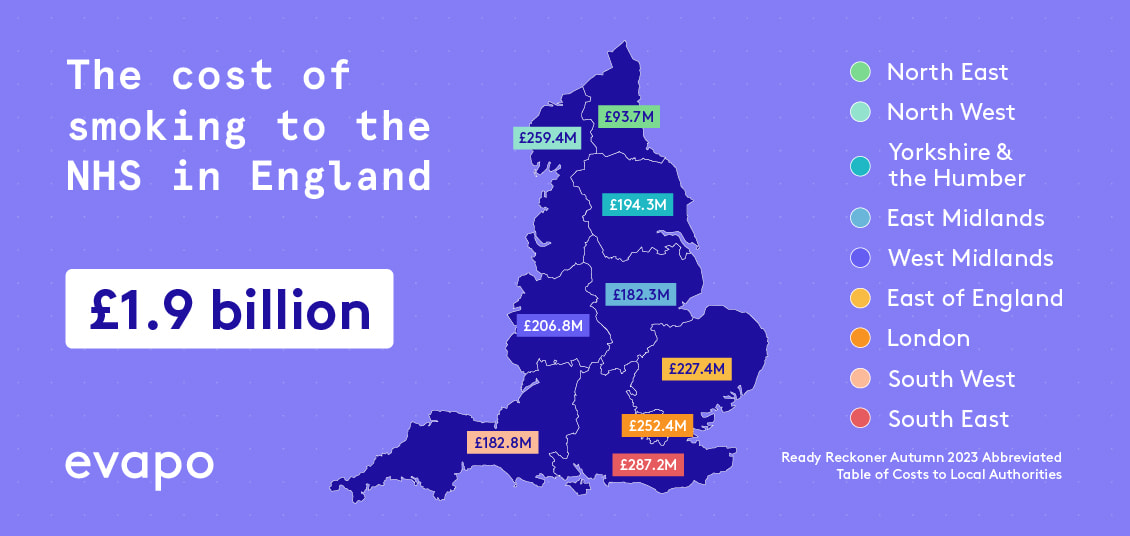A new study from Brunel University London has explored how smokers making the switch to vaping could help to ease the financial burden that smoking lays on the NHS in England.
The cost of smoking
Although we all know about the harmful effects of smoking and how extremely damaging it is to health, it still remains the single biggest cause of preventable illness and premature death in England. Every year there are approximately 74,600 deaths attributed to smoking, and there were an estimated 506,100 smoking-related hospital admission in England between 2019 and 2020.
Because of this, smoking is a substantial burden to the NHS and it is estimated that smoking costs the NHS in England approximately £2.5 billion per year. We delved deeper into the cost of smoking in England in our blog post ‘Smoking costs England £17.3 billion each year’, where we consider everything from the cost of treatment and care, to the cost to the economy from loss of productivity at work due to smoking-related illness.

How vaping could save the NHS millions
Professor Francesco Moscone, a business economics expert from Brunel undertook the study as a way to assess the potential savings for the NHS if some of the over 6 million smokers in the UK were to stop smoking with the help of a reduced risk product, known as an RRP, like an e-cigarette. He explained:
“Cancer, heart disease, stroke, chronic bronchitis, and emphysema are the five main disease categories caused by smoking cigarettes. Such illnesses put significant burdens on the NHS, which we know is already under increasing pressure,”
Although the long-term effects of RRPs are still unknown, we know from previous research that alternatives to traditional cigarettes result in a 90% reduction in the exposure to chemicals that are major contributors to health risks.”
The study used data from NHS Digital, the Royal College of Physicians, and the Office for National Statistics (ONS) to identify smoking prevalence in each region of England, and identified that between 2019 and 2021 13.6% of people over the age of 18 were smokers.
They were able to calculate that a smoker making the switch to RRPs would have a 70% reduction in smoking-related diseases, based on the fact that they would no longer be exposed to the countless harmful chemicals in cigarette smoke. The team then calculated the total health expenditure by using the average ward costs and length of stay in hospital for the five main smoking related disease categories: cancer, heart disease, stroke, chronic bronchitis, and emphysema.
They identified that if just 10% of smokers made the switch to a RRP like vaping this could save the NHS £103 million per year, and if 50% of current smokers were to make the switch the NHS would save an incredible £518 million on average per year.
The study also took geographical differences between the different regions into account, identifying that the number of people with lung cancer in the North East & Yorkshire region is almost double that of other regions. They highlighted that this area in particular are facing significant challenges from smoking-related health issues, with the treatment of lung cancer alone costing the NHS over £156 million per year, and would therefore see the biggest reduction in costs if smokers were to make the switch.
This research could be crucial when it comes to identifying the particular regions that are hit hardest by smoking, and where initiatives to help smokers make the switch could have the most impact.
Professor Moscone highlighted the potential benefits that such savings would have, saying:
“If smokers transitioned to RRPs, it would significantly reduce the pressure on the NHS and free up much-needed hospital resources for other treatments.”
Are e-cigarettes an effective alternative to smoking?
There is an abundance of research that has not only found e-cigarettes to be a less harmful alternative to smoking, but also an extremely effective alternative.
The Office for Health Improvement and Disparities found vaping to be at least 95% less harmful than smoking in their Nicotine vaping in England: 2022 evidence update, and the 2022 Cochrane review found that vaping is twice as effective as other nicotine replacement therapy options like nicotine patches and nicotine gum. A study has even identified vaping as being better than other nicotine replacement therapy pregnant women to quit smoking during pregnancy, which you can read more about here.
E-cigarettes do not contain the countless harmful substances that are found in tobacco smoke, like tar and carbon monoxide, and offer users a less harmful way to continue using nicotine. They are designed to replicate the feel and action of smoking, and allow users to manage their nicotine cravings during a stop smoking attempt to avoid nasty nicotine withdrawal symptoms and offer them a greater chance of success and to stay quit for good.
Unlike other forms of nicotine replacement therapy, these electronic devices allow precise control over the nicotine strength used as e-liquids are available in a wide range of different nicotine levels. This allows the user to use their previous smoking habits to identify the right nicotine strength to suit them and avoid nicotine withdrawal as they make the switch.
Because vaping also replicates the act of smoking, it also helps address the physical habit, which is another important step for many people who are trying to quit smoking.
'Swap to stop' campaign
To that end, the Government launched their ‘swap to stop’ campaign in April of this year, which will offer one million smokers an e-cigarette to help them make the switch to a safer alternative. This is one of the steps they are taking towards the ambition for England to be smoke-free by 2030, and you can read more about it in our blog post 'Government supports vaping with 'swap to stop' scheme'.
Speaking on this, chief executive of Action on Smoking and Health (ASH), Deborah Arnott, said:
“This study provides further evidence that by providing one million vapes to smokers to help them quit, the Government’s ‘swap to stop’ campaign would help reduce pressure on our overstretched NHS.’’
Smoke-free 2030
Initiatives like the ‘swap to stop’ scheme are absolutely crucial if we are to have any hope of meeting the smoke-free 2030 goal, especially seeing as the Government reported last year that without further action England will miss this target by at least 7 years, and those in the poorest areas may not meet the target until 2044.
Professor Moscone explains:
“Embracing the transition to RRPs would not only save the NHS millions of pounds, but it would present a crucial opportunity for us to regain momentum and align with our ambitious 2030 plan,”
By embracing innovation and recognising the potential of RRPs, we can chart a course towards a future with reduced risks while remaining resolute in our commitment to achieving our goals.”
If you or someone you know have been considering making the switch from smoking to vaping and are looking for more information, pop in to one of our Evapo specialist vape shops and speak with a member of our team, or reach out to our online Customer Service team for advice and recommendations.
At a glance
- A study has found that if 50% of smokers make the switch to vaping it could save the NHS in England £518 million per year
- It is estimated that smoking currently costs the NHS in England approximately £2.5 billion per year
- Smokers who made the switch to vaping would have a 70% reduction in smoking-related diseases, based on the fact that they would no longer be exposed to the countless harmful chemicals in cigarette smoke
Sources
brunel.ac.uk 07/08/2023
ons.gov.uk 06/12/2022
ash.org.uk 05/2021
gov.uk 29/09/2022
cochrane.org 17/11/2022
nature.com 26/05/2022
gov.uk 11/04/2023


























